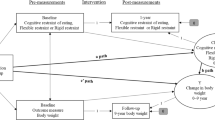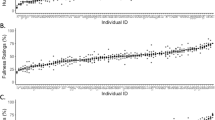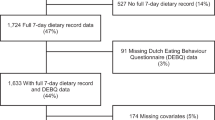Abstract
Background/Objectives:
The relationship between food craving and dieting is mixed and uncertain, with little evidence during active weight management. Accordingly, the frequency and nature of food cravings were investigated in people attending a commercial weight management programme.
Subjects/Methods:
An online survey was completed by 2932 participants (97% female, mean age=43.0 years, mean body mass index=31.6 kg/m2). Assessments included the Control of Eating Questionnaire, measuring the frequency, intensity, specificity and behaviour following food cravings. Others included body weight, dietary restraint, perceived success of dieting and mood. Forty-two per cent of the sample completed a second survey 7 weeks later.
Results:
Cross-sectional analysis showed those currently dieting to lose weight (55% of sample) had significantly fewer, less intense and more resisted food cravings than those watching what they ate so as not to gain weight (35% of sample). Cravings were fewer for chocolate and other sweet foods. Longitudinally, food cravings decreased over the period of weight loss (2.0 kg). Fewer foods were craved and the cravings were less intense, easier to resist and to control. Eating in response to food cravings was a significant predictor of weight change.
Conclusions:
People with obesity and recent experience of resisting eating in response to food cravings lost more weight over the next 7 weeks. Feeling in control of eating was also associated with greater weight loss. This suggests it is the behaviour that follows food cravings rather than simply their frequency or intensity that contributes to successful weight management. This has implications for interventions to help address food cravings.
This is a preview of subscription content, access via your institution
Access options
Subscribe to this journal
Receive 12 print issues and online access
$259.00 per year
only $21.58 per issue
Buy this article
- Purchase on Springer Link
- Instant access to full article PDF
Prices may be subject to local taxes which are calculated during checkout
Similar content being viewed by others
References
Meule A, Westenhofer J, Kubler A . Food cravings mediate the relationship between rigid, but not flexible control of eating behavior and dieting success. Appetite 2011; 57: 582–584.
Massey A, Hill AJ . Dieting and food craving: a descriptive, quasi-prospective study. Appetite 2012; 58: 781–785.
Potenza MN, Grilo CM . How relevant is food craving to obesity and its treatment? Front Psychiatry 2014; 5: 164.
Lowe MR, Levine AS . Eating motives and the controversy over dieting: eating less than needed versus less than wanted. Obes Res 2005; 13: 797–806.
Hill AJ . The psychology of food craving. Proc Nutr Soc 2007; 66: 277–285.
Martin CK, O‘Neil PM, Pawlow L . Changes in food cravings during low calorie and very-low-calorie diets. Obes 2006; 14: 115–121.
Gilhooly CH, Das SK, Golden JK, McCrory MA, Dallal GE, Saltzman E et al. Food cravings and energy regulation: the characteristics of craved foods and their relationship with eating behaviors and weight change during 6 months of dietary energy restriction. Int J Obes 2007; 31: 1849–1858.
Apovian CM, Aronne L, Rubino D, Still C, Wyatt H, Burns C et al. A randomized, phase 3 trial of naltrexone SR/bupropion SR on weight and obesity-related risk factors (COR-II). Obes 2013; 21: 935–943.
Batra P, Krupa Das S, Salinardi T, Robinson L, Saltzman E, Scott T et al. Relationship of cravings with weight loss and hunger. Results from a 6 month worksite weight loss intervention. Appetite 2013; 69: 1–7.
Meule A, Lutz A, Vögele C, Kübler A . Food cravings discriminate differentially between successful and unsuccessful dieters and non-dieters: validation of the food cravings questionnaire in German. Appetite 2012; 58: 88–97.
The English Indices of Deprivation 2010: http://www.communities.gov.uk/publications/corporate/statistics/indices2010.
Dalton M, Finlayson G, Hill AJ, Blundell JE . Preliminary validation and principal components analysis of the Control of Eating Questionnaire (CoEQ) for the experience of food craving. Eur J Clin Nutr 2015; 69: 1313–1317.
Karlsson J, Perrson LO, Sjöström L, Sullivan M . Psychometric properties and factor structure of the Three-Factor Eating Questionnaire (TFEQ) in obese men and women. Results from the Swedish Obese Subjects (SOS) study. Int J Obes 2000; 24: 1715–1725.
Meule A, Papies EK, Kubler A . Differentiating between successful and unsuccessful dieters. Validity and reliability of the Perceived Self-Regulatory Success in Dieting Scale. Appetite 2012; 58: 822–826.
Lovibond SH, Lovibond PF . Manual for the Depression Anxiety Stress Scales. 2nd edn. Psychology Foundation: Sydney, Australia, 1995.
Westenhoefer J, Stunkard AJ, Pudel V . Validation of the flexible and rigid control dimensions of dietary restraint. Int J Eat Disord 1999; 26: 53–64.
Witt AA, Katterman SN, Lowe MR . Assessing the three types of dieting in the Three-Factor model of dieting. The Dieting and Weight History Questionnaire. Appetite 2013; 63: 24–30.
Blechert J, Naumann E, Schmitz J, Herbert BM, Tuschen-Caffier B . Startling sweet temptations: hedonic chocolate deprivation modulates experience, eating behavior, and eyeblink startle. PLos One 2014; 9: e85679.
Polivy J, Coleman J, Herman CP . The effect of deprivation on food cravings and eating behavior in restrained and unrestrained eaters. Int J Eat Disord 2005; 38: 301–309.
Hill AJ, Heaton-Brown L . The experience of food craving: a prospective investigation in healthy women. J Psychosom Res 1994; 38: 801–814.
White MA, Whisenhunt BL, Williamson DA, Greenway FL, Netemeyer RG . Development and validation of the food‐craving inventory. Obes Res 2002; 10: 107–114.
Cepeda-Benito A, Gleaves DH, Williams TL, Erath SA . The development and validation of the state and trait Food-Cravings Questionnaires. Behav Ther 2000; 31: 151–173.
Guthrie H, Tetley D, Hill AJ . Quasi-prospective, real-life monitoring of food craving post-bariatric surgery: comparison with overweight and normal weight women. Clin Obes 2014; 4: 136–142.
Waters A, Hill AJ, Waller G . Bulimics’ responses to food cravings: is binge-eating a product of hunger or emotional state? Behav Res Ther 2001; 39: 877–886.
Ng L, Davis C . Cravings and food consumption in binge eating disorder. Eat Behav 2013; 14: 472–475.
Kemps E, Tiggemann M . A role for mental imagery in the experience and reduction of food cravings. Front Psychiatry 2015; 5: 193.
Giuliani NR, Calcott RD, Berkman ET . Piece of cake. Cognitive reappraisal of food craving. Appetite 2013; 64: 56–61.
Lacaille J, Ly J, Zacchia N, Bourkas S, Glaser E, Knauper B . The effects of three mindfulness skills on chocolate cravings. Appetite 2014; 76: 101–112.
Acknowledgements
We are grateful to SW for collaborating in this research. No funding was sought or received for this research and the company had no role in study design, data analysis, in the decision to publish or preparation of the manuscript. Both authors designed and conducted this work, drafted the manuscript and approved the final version.
Author information
Authors and Affiliations
Corresponding author
Ethics declarations
Competing interests
AJH has received payment as an advisor for Slimming World. The remaining authors declare no other conflict of interest.
Rights and permissions
About this article
Cite this article
Smithson, E., Hill, A. It is not how much you crave but what you do with it that counts: behavioural responses to food craving during weight management. Eur J Clin Nutr 71, 625–630 (2017). https://doi.org/10.1038/ejcn.2016.235
Received:
Revised:
Accepted:
Published:
Issue Date:
DOI: https://doi.org/10.1038/ejcn.2016.235
This article is cited by
-
Homeostasis and food craving in obesity: a functional MRI study
International Journal of Obesity (2021)
-
The Psychology of Food Cravings: the Role of Food Deprivation
Current Nutrition Reports (2020)
-
Food craving predicts the consumption of highly palatable food but not bland food
Eating and Weight Disorders - Studies on Anorexia, Bulimia and Obesity (2019)
-
Effects of addictive-like eating behaviors on weight loss with behavioral obesity treatment
Journal of Behavioral Medicine (2019)
-
Obesity and Eating Disturbance: the Role of TFEQ Restraint and Disinhibition
Current Obesity Reports (2019)



